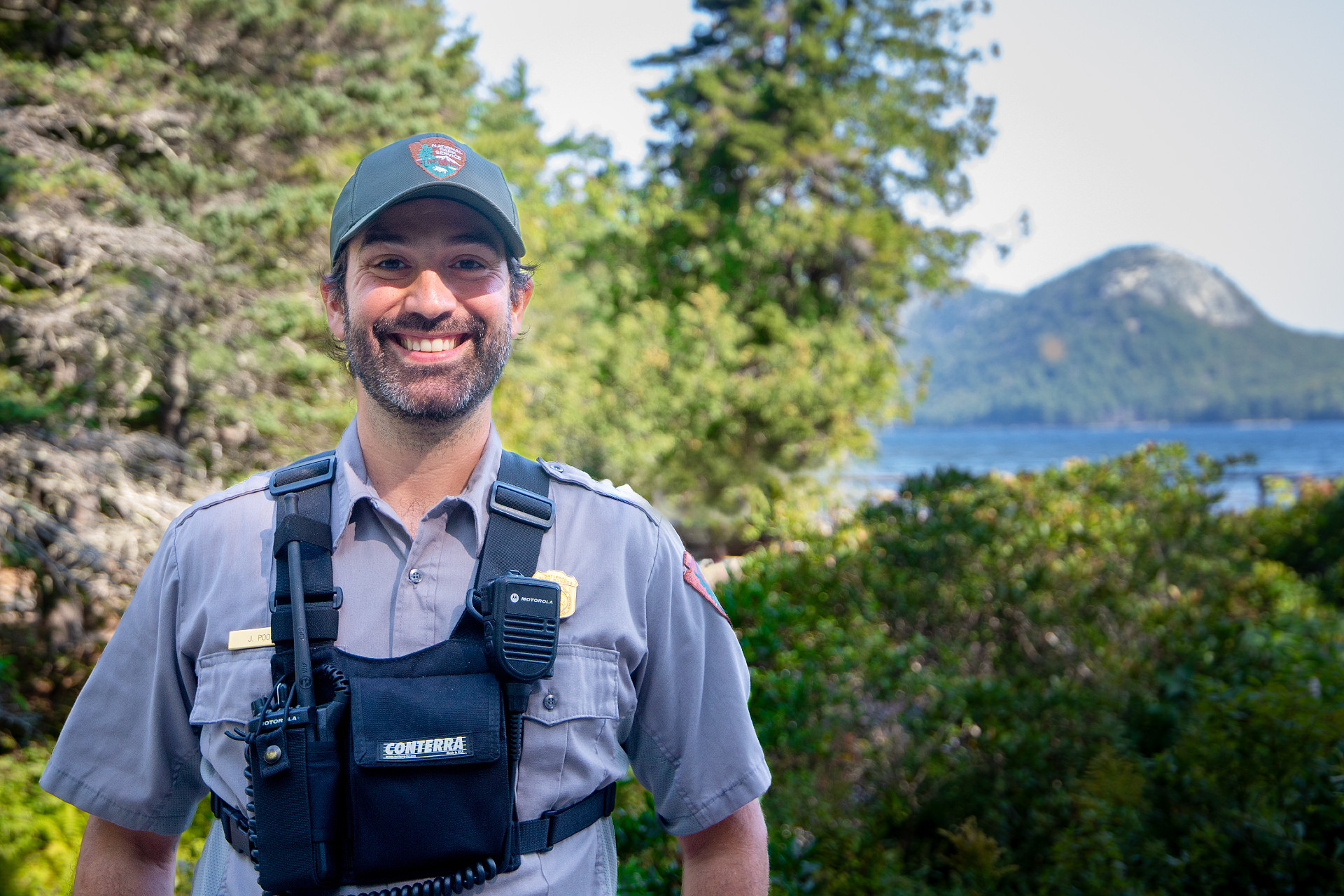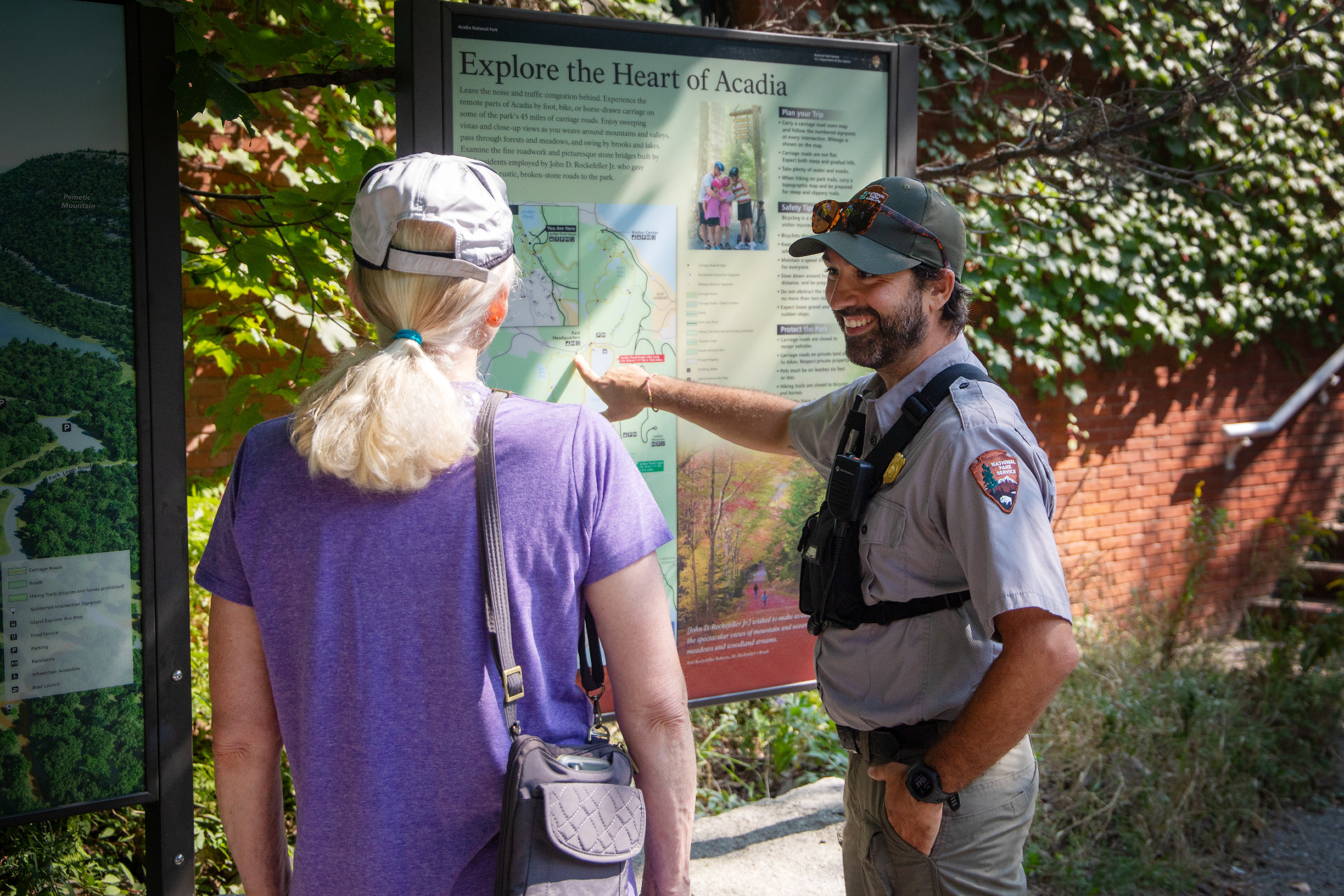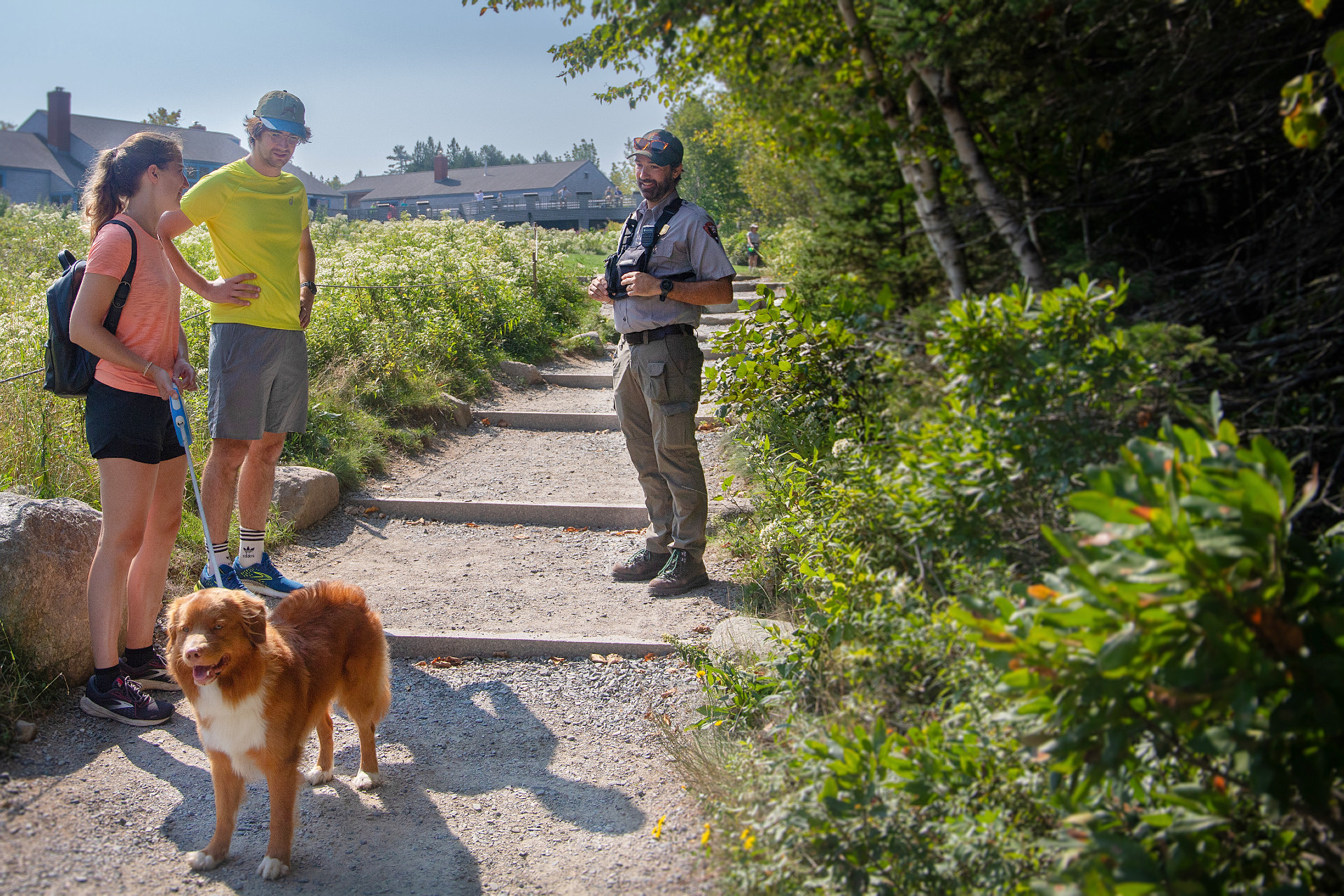Meet Jonathan Pooler
General Ranger at Acadia National Park
October 25th, 2023
General Ranger at Acadia National Park
October 25th, 2023
In this series, we’re spotlighting the talented and dedicated staff of Acadia National Park who deliver an incredible visitor experience day after day. Whether working directly with park visitors or behind the scenes, seasonally or year-round, these are the people who make the park hum. They work hard and wear many hats, keeping the park in incredible shape, keeping park visitors safe, and rising to the occasion as visitation has reached peak levels in recent years. We at Friends of Acadia appreciate the work they do. Thank you!
Read all of the Front & Center stories

Acadia National Park General Ranger Jonathan Pooler. (Photo by Ashley Anderson/Friends of Acadia)
BY SHANNON BRYAN
General Ranger Jonathan Pooler spent this season – his first in Acadia National Park – out and about in the park striking up conversations with visitors.
“I get to rove the park – pretty much wherever I want to go,” Pooler said. Where he wants to go is where the people are: Sand Beach, Cadillac Mountain, Thunder Hole, Jordan Pond. “That’s where you can make the most impact,” he said.
Pooler is one of four general rangers who worked in Acadia National Park this season. While the role of general ranger isn’t new for the National Park Service, this marks the first year for general rangers in Acadia.
It sounds like straightforward work, ideal for this gregarious park ranger, but the role is also an effective way to help visitors safely navigate the park, be conscientious stewards, and have an excellent time while they’re at it. Balancing all that well is an art.
As the title suggests, general rangers wear many hats. They assist visitors with park resources, provide emergency medical services (general rangers are all EMT certified), and they rove the park to enforce rules and regulations. Pooler recognizes that the enforcement portion of his job is best done with an empathetic approach.
“The uniform comes with a big responsibility,” he said. “A lot of people see the green and gray, they see the badge, they see the flat cap and they automatically assume you are an authority. They think, ‘I don’t want to get in trouble; you’re a ranger!’”
Pooler says he’s mindful to engage with visitors in a friendly and welcoming way. Often that begins with a smile and a “Hello” or “How’s your visit?”

“The better time people have at a park, the more likely
they are to be stewards of that area,” says General Ranger Jonathan Pooler. (Photo by Ashley Anderson/Friends of Acadia)
General rangers also do preventative search and rescue, or PSAR, which involves engaging with visitors before there’s a potential emergency. That might include talking with hikers at a trailhead about slippery trail conditions or whether they’ve brought water with them for a hike on a hot and humid day.
Those conversations can help visitors better understand what they’re in for and assess whether they’re prepared – which makes for a decidedly more pleasant experience for them – but it also aims to prevent emergency calls later.
Pooler says visitors seem to appreciate his recommendations and the chance to have a conversation with a ranger – both of which add to a great experience in the park.
And that has ongoing impact, too.
“The better time people have at a park, the more likely they are to be stewards of that area,” he said. “I love promoting stewardship by leading by example.”
Before donning the green-and-gray uniform in his role as park ranger, Pooler was more likely to be spotted in a chef’s coat. He worked as a chef for 13 years, then taught in a culinary program at a charter school.
But he’s always been drawn to the outdoors. “I grew up camping, hiking, and just wandering the woods (in Michigan),” he said. As an adult, he went on a backpacking trip to Isle Royale National Park in Michigan. “It was such an amazing experience – it’s one of my favorite parks,” he said. “I got to talk to the rangers there, and I was like, if I didn’t cook, I’d want to be a park ranger.”
It wasn’t until some years later when Pooler and his then-fiancée were driving through Pennsylvania and spotted a billboard advertising “America’s Largest RV Show” that his path to the park service began to take shape.
That billboard inspired the couple to save up some money and take to the road in an RV. For the last several years they’ve traveled the country, volunteering and working seasonal jobs in state and national parks and then travelling in the off season.
Pooler spent time volunteering at Aztec Ruins National Monument and with the Department of Fish and Wildlife in Florida. He’s worked at Chaco Culture National Historic Park, Big Horn National Recreation Area, and Anza-Borrego Desert State Park – the change of season there still lingers in his memory.
He gets why people are drawn to the outdoors, whether for a lifetime or their first time.
“Outdoor recreating has become huge in the U.S. The pandemic pushed even more people outside,” he said. “So often, you’re meeting people who have never outdoor recreated in their life, and they’re hiking for the first time.”
Pooler’s intent is to help make sure they’re safe and prepared, but without making anyone feel bad. Chastising deters people from wanting to go outdoors again, and that’s not what national parks are about.
“Being that positive influence, that positive representation of Acadia National Park and of the park service in general, that will help people have a really great experience,” said Pooler. “So when they look back, they’ll think, ‘Oh wow, I had such a good time in Acadia. That park ranger really helped me out—that place is the best.’”

Acadia National Park General Ranger Jonathan Pooler
talks with park visitors near Jordan Pond House. (Photo by Ashley Anderson/Friends of Acadia)
Take a little time to go onto the park’s website. Look up the hikes you might want to do and see how long or challenging they are. People often just see an image on social media and decide they want to go to that spot, without looking into what it takes to get there.
Sometimes the weather doesn’t cooperate, or a trailhead is extremely busy. Be open-minded about changing plans when a hike might not be safe, or an area of the park is congested. There’s so much to see and do in Acadia – alternative options abound!
You don’t need to be a survivalist, but it’s wise to have extra water, warm layers, and some snack foods with you while exploring the park. A short hike can get serious fast—a slip on wet rock or a humid day that dehydrates you quickly could mean bad news. Besides, no one wants to be hangry on vacation.
The free brochure handed out at the Hulls Cove Visitor Center and park entrance gates will give you the lay of the land, but if you’re hiking the trails in Acadia, buy a trail map that has all the trails on it.
It’s free and it goes all around Mount Desert Island and Acadia National Park – the Schoodic Peninsula, too. No need to fight for parking – just leave your vehicle for the day and ride the bus!
SHANNON BRYAN is Friends of Acadia’s Content and Website Manager.